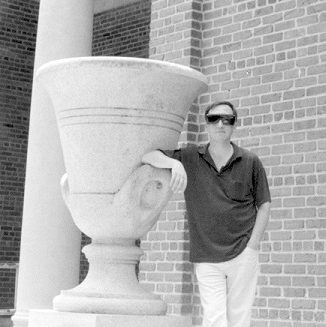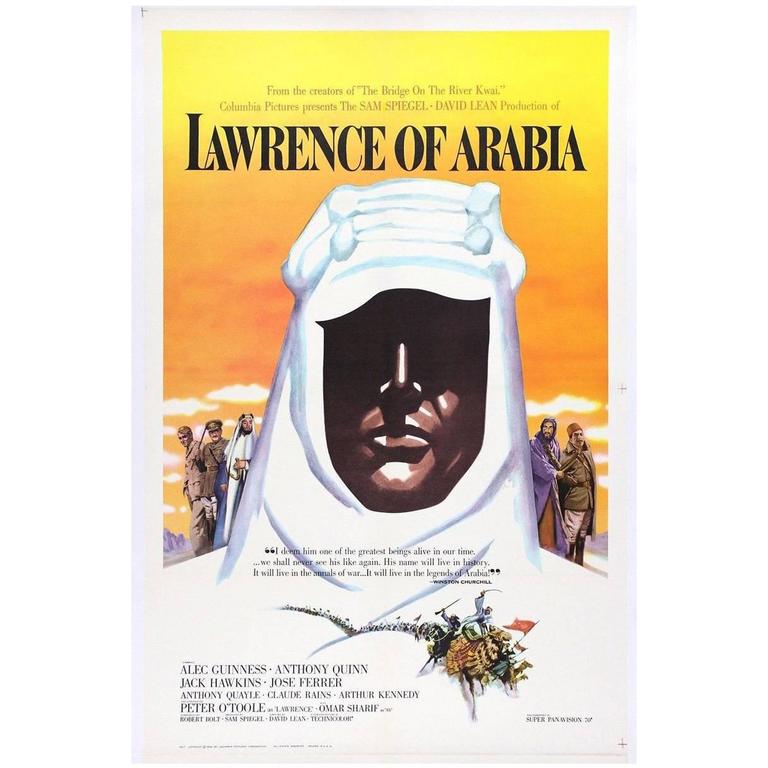By Scott Ross
Billy Wilder: “What the hell does the Academy Award mean, for God’s sake? After all, Luise Rainer won it two times — Luise Rainer!”
While preparing my recent entry on Around the World in 80 Days I ran across a number of Internet articles naming it one of the worst movies to have won the Best Picture Oscar. Setting aside from the moment my own mild umbrage — and just what the hell is wrong with a witty, charming, and genuinely entertaining movie? — take a moment some time to look up the other winners. And if you are fool enough, or gullible enough, to imagine that an Academy Award betokens actual artistic greatness or confers some sort of magnitude of its own, or ever did, you may stop reading now.
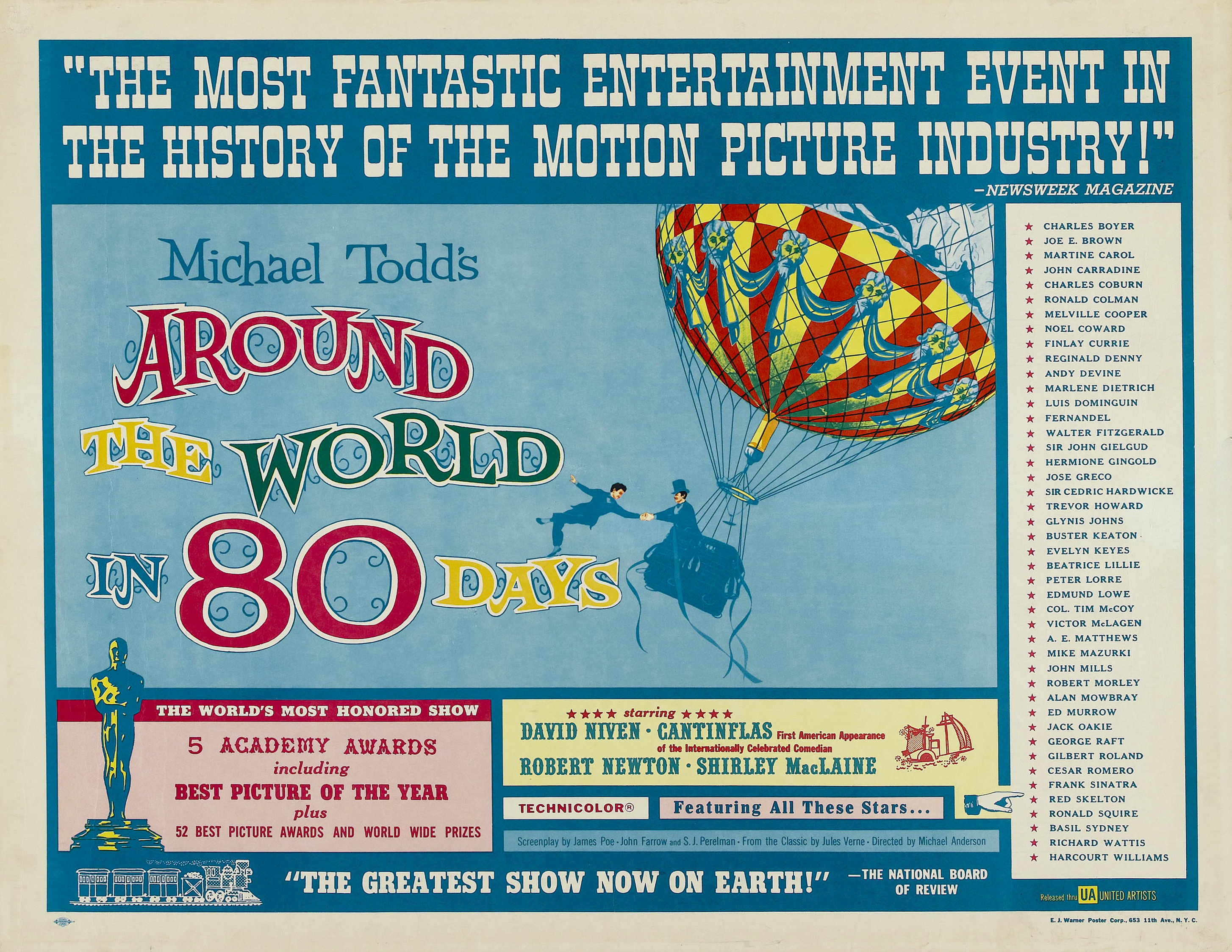
Which big Oscar winners are demonstrably “great” movies, either of their years or ever? How many?
As it turns out: Damn few.
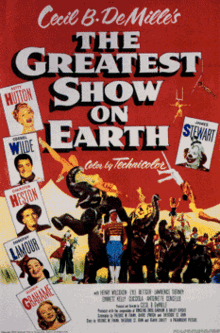
Asked by the filmmaker for his opinion of the movie he’d just seen, Billy Wilder bowed and replied, “Mr. DeMille, you have made The Greatest Show on Earth.” Naturally, C.B. didn’t get the put-down, and was delighted.
First, remove the creaky and historically significant or perhaps moderately technically innovative but otherwise undistinguished pictures (Wings, The Broadway Melody, Cimarron.) Then omit the inexplicable (Cavalcade, The Great Ziegfeld, The Greatest Show on Earth)*, the gaudily extravagant (Grand Hotel, Ben-Hur) and the once-distinguished, “problem” pictures that strike us now — and struck some then — as wildly overrated (The Best Years of Our Lives, Gentleman’s Agreement, One Flew Over the Cuckoo’s Nest, American Beauty.) Strike off the Huh??? entries (You Can’t Take It With You, Rebecca, Mrs. Miniver, Going My Way, The Deer Hunter, Kramer vs. Kramer, Rain Man, Forrest Gump), the super-productions that in their mammoth, “tasteful” way — and their box-office takes — had “Oscar-Bait” written all over them (Olivier’s Hamlet, A Man for All Seasons, Amadeus, Out of Africa, The Last Emperor, Titanic), the surprise and/or thumb-your-nose winners (Marty) and the earnest, striving — and frequently boring — recent-history spectacles (From Here to Eternity, Gandhi, The English Patient.)
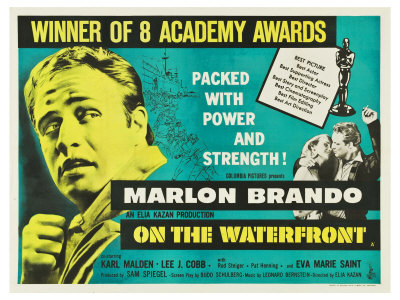
Despite Brando’s towering performance, On the Waterfront is one of the most bizarrely overrated movies of its time, and a deliberate paean to the nobility of the informer by a pair of unrepentant Hollywood rats named Budd Schulberg and Elia Kazan.
Delete the oddball choices, usually musicals, and never the best ones (West Side Story, My Fair Lady, The Sound of Music and Chicago but not Top Hat, Singin’ in the Rain or Fiddler on the Roof), the “classic” titles you hope never, ever to have to sit through again (On the Waterfront)†and the big movies of their years that now leave us scratching our heads that anyone could have voted for them (Mutiny on the Bounty, Patton.) Pull out the ones that won largely because either they were un-ignorable or their makers had already lost for better movies (The Lord of the Rings: The Return of the King, The Departed) and the Oooh-Look-He-Can-Direct! choices (Annie Hall, Ordinary People, Dances with Wolves — never forget that actors form the largest bloc of Academy voters.) I, meanwhile, will scratch those I either haven’t seen (All Quiet on the Western Front, All the King’s Men, Chariots of Fire, Million Dollar Baby, Crash, No Country for Old Men, The Hurt Locker, The Artist) or that I simply don’t wish to (Braveheart, Shakespeare in Love, Gladiator, A Beautiful Mind, Slumdog Millionaire, The King’s Speech, Argo.)
With what are we left? Not all that bloody much: A smattering of items that make for a pleasant couple of hours’ viewing but can in no way be classed among the best ever made (The Life of Emile Zola, Terms of Endearment, Driving Miss Daisy.) Several very fine entertainments that could be described as among the most enjoyable of all movie-movies (Gone with the Wind, Casablanca, All About Eve, An American in Paris, Oliver! and. yes, Around the World in 80 Days) but which hardly qualify as masterpieces. Some equally good dramas that were, at the time of their release, either genuinely shocking (The Lost Weekend, Midnight Cowboy)‡ or uniquely reflective of the zeitgeist (In the Heat of the Night, The French Connection, Platoon) but that, in retrospect, are not among their creators’ best or most important pictures… or, in the case of William Friedkin, probably do, alas, represent his best.
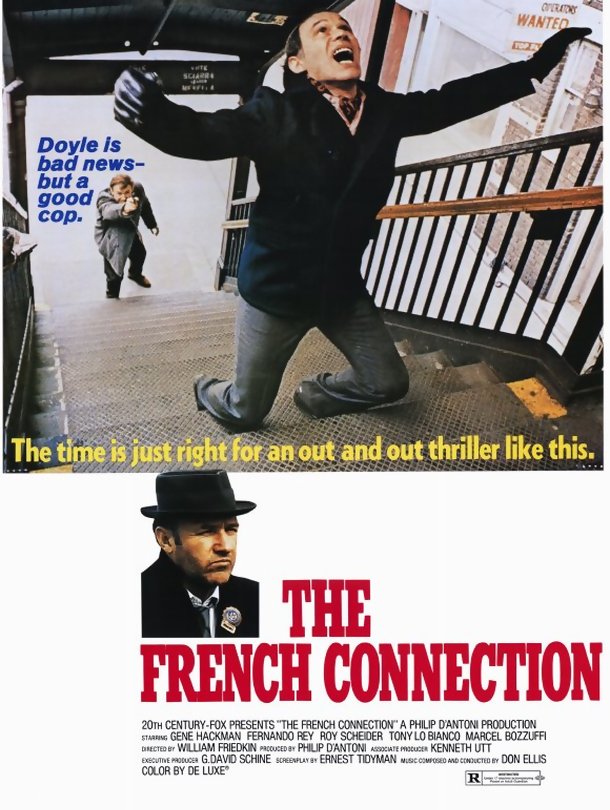
This was “better” than Fiddler on the Roof and The Last Picture Show?
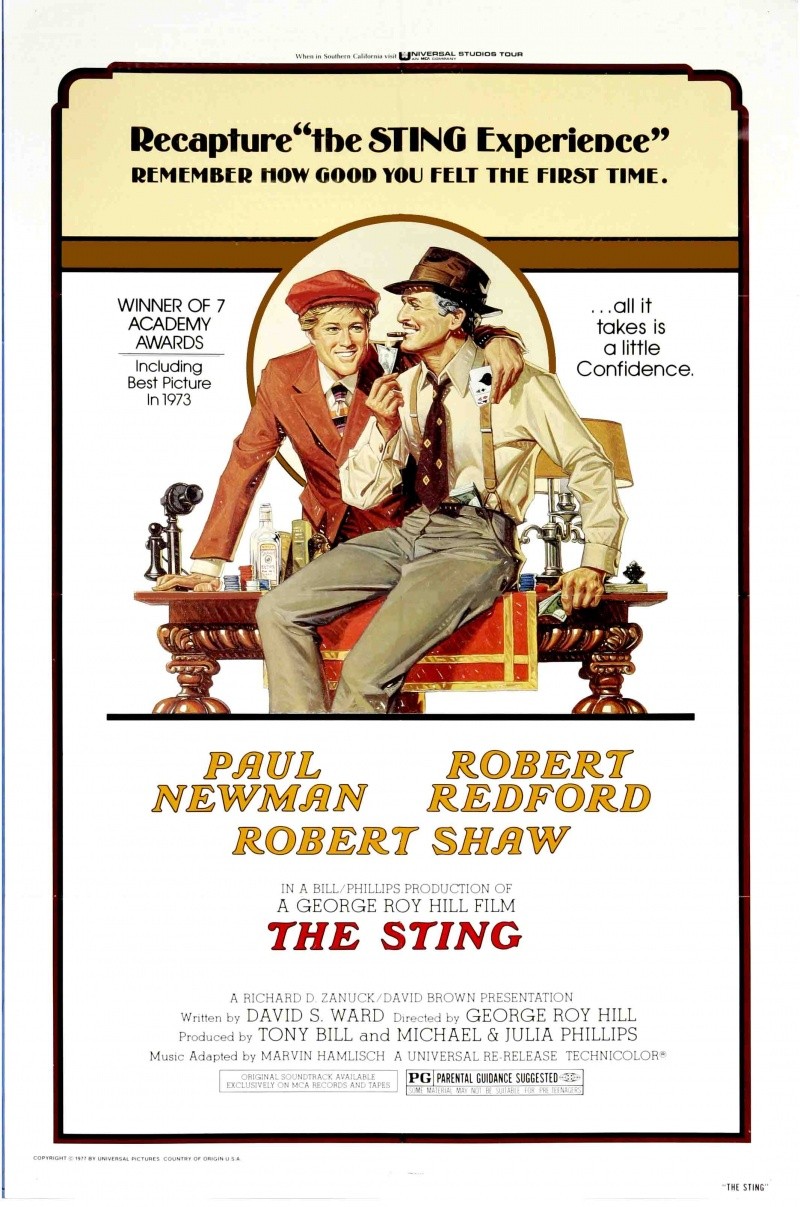
I missed The Sting on its initial release, catching up to it four years later, when it was reissued. I went back to it over and over, I was so enchanted. It’s still one of my very favorite movies. But “Best Picture”? My personal jury is out on that one.
That leaves at best a baker’s-dozen that have either stood the test of greatness over time (It Happened One Night, How Green Was My Valley, The Bridge on the River Kwai, Gigi, The Apartment, Lawrence of Arabia, Tom Jones, The Godfather, The Sting, The Godfather Part II) or likely will (The Silence of the Lambs, Unforgiven, Schindler’s List.) And even here, are Tom Jones, Gigi and The Sting, as marvelously entertaining as they are, quantifiable as masterworks? The Sting in particular makes me about as happy watching it as any movie ever made, but whatever my love for it, I can hardly classify it as important. Neither is The Silence of the Lambs, except as an example of how gifted filmmakers can turn compelling, one-step-up-from-pulp material into a nuanced exercise in terror that never, despite its grotesqueries, sinks into the gross or manipulative. Which leaves us with a grand total of nine. Nine important, lasting testaments to the art of film — and popular art, no less, which is infinitely more difficult to achieve than it may seem.

Billy Wilder’s and I.A.L. Diamond’s biggest hit (until Irma La Douce) was also one of their very finest movies, and one of the best ever made.
The only true comedy (It Happened One Night) is also a tartly observed slice of Depression Era verisimilitude, juxtaposed with slightly screwball romance. The Apartment — a rare example of the Academy honoring real quality — is nominally comic, but its dark undertones include pandering, bibacity, joyless adultery, attempted suicide and a coruscating critique of the American capitalist nightmare. How Green Was My Valley has been attacked retroactively for beating Citizen Kane, but it’s not only John Ford (and Phillip Dunne), it’s Ford and Dunne at their considerable best. Lawrence of Arabia remains arguably the most intelligent epic ever made, superb in screenplay, direction, photography, theme, acting and approach to the essentially unknowable, and Kwai isn’t far behind. Unforgiven is as fine an examination of the price (and morality) of violence as anyone has made, and certainly Clint Eastwood’s best work as a filmmaker; and Schindler’s List is such an overpowering experience that, while one may, as I do, prefer other movies in its filmmaker’s oeuvre (Jaws, Close Encounters of the Third Kind) its raw, unblinking honesty is as unforgettable as it is artistically, socially and historically laudable.
As for the two Godfather films, they hardly require my, or anyone’s, defense.
Nine demonstrably great “Best Pictures” in eight decades. A record of which only Academy voters could be proud.
Oh — and the nadir? The absolute worst “Best” picture ever?
Without a scintilla of a doubt: Rocky.
Jesus wept!
Text copyright 2014 by Scott Ross
*Asked by the producer-director for his opinion of the movie he’d just seen, Billy Wilder bowed and replied, “Mr. DeMille, you have made The Greatest Show on Earth.” Naturally, C.B. didn’t get the put-down, and was delighted.
†Despite Brando’s towering performance, On the Waterfront is one of the most bizarrely overrated movies of its time —a deliberate paean to the nobility of the informer by a pair of unrepentant Hollywood rats.
‡Actually, I take that back about Midnight Cowboy — it arguably is John Schlesinger’s best movie.
Post-Script, 2020. I now realize, reading over this, that I was entirely too hard on Casablanca, which I’ve always loved and which strikes me, despite the over-lush romanticism of some of Casey Robinson’s dialogue for Bogart and Bergman, as even better, and more emotionally resonant, with time. Seeing each of them again recently I also now think, what the hell!, that a picture as joyous and entertaining as The Sting deserves whatever it gets in the way of honors; that Platoon was in fact one of Oliver Stone’s best movies; that All About Eve really is as good as it’s reputed (although it isn’t a patch on Sunset Blvd., the picture that probably should have won that year); and that The Life of Emile Zola is, despite its shimmering black-and-white cinematography and a fine supporting performance by Donald Crisp, little more than a well-intentioned and poorly acted bore. Everything else I stand behind.
